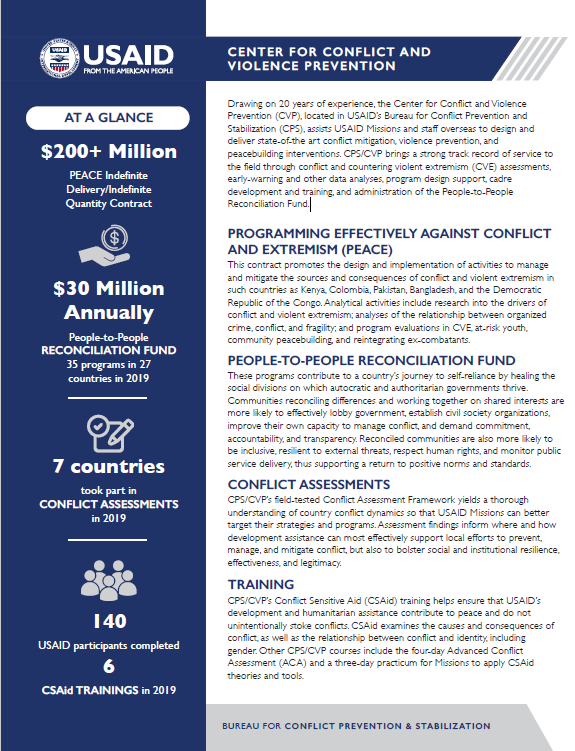- Who We Are
- Mission, Vision and Values
- Organization
- Leadership
- Office of the Administrator
- USAID at 60
- Bureaus
- Africa
- Asia
- Europe and Eurasia
- Latin America and the Caribbean
- Middle East
- Bureau for Development, Democracy, and Innovation (DDI)
- Bureau for Resilience and Food Security
- Global Health
- Legislative and Public Affairs
- Management
- Policy, Planning and Learning
- Foreign Assistance
- Bureau for Conflict Prevention and Stabilization
- Bureau for Humanitarian Assistance (BHA)
- Center of Excellence on Democracy, Human Rights and Governance
- Office Of Economic Policy
- Office of American Schools and Hospitals Abroad
- Office of Education
- Office of Energy & Infrastructure
- Office of Food for Peace
- Office of Forestry and Biodiversity
- Office of Gender Equality & Women’s Empowerment
- Office of Global Climate Change
- Office of Land and Urban
- Office of Local Sustainability
- Office of Private Capital and Microenterprise
- Office of Program, Policy, and Management
- Office of Trade & Regulatory Reform
- Office of U.S. Foreign Disaster Assistance
- Office of Water
- Independent Offices
- Mission Directory
- Advisory Committee
- Board for International Food and Agricultural Development
- Mission Directors
- Coordinators
- USAID History
- Operational Policy (ADS)
- Transparency
- Resource Portal
- The Journey to Self-Reliance
Speeches Shim
Drawing on 20 years of experience, the Center for Conflict and Violence Prevention (CVP), located in USAID’s Bureau for Conflict Prevention and Stabilization (CPS), assists USAID Missions and staff overseas to design and deliver state-of-the art conflict mitigation, violence prevention, and peacebuilding interventions. CPS/CVP brings a strong track record of service to the field through conflict and countering violent extremism (CVE) assessments, early-warning and other data analyses, program design support, cadre development and training, and administration of the People-to-People Reconciliation Fund.
At A Glance
Programming Effectively Against Conflict and Extremism (PEACE)

This contract promotes the design and implementation of activities to manage and mitigate the sources and consequences of conflict and violent extremism in such countries as Kenya, Colombia, Pakistan, Bangladesh, and the Democratic Republic of the Congo. Analytical activities include research into the drivers of conflict and violent extremism; analyses of the relationship between organized crime, conflict, and fragility; and program evaluations in CVE, at-risk youth, community peacebuilding, and reintegrating ex-combatants.
People-to-People Reconciliation Fund

These programs contribute to a country’s journey to self-reliance by healing the social divisions on which autocratic and authoritarian governments thrive. Communities reconciling differences and working together on shared interests are more likely to effectively lobby government, establish civil society organizations, improve their own capacity to manage conflict, and demand commitment, accountability, and transparency. Reconciled communities are also more likely to be inclusive, resilient to external threats, respect human rights, and monitor public service delivery, thus supporting a return to positive norms and standards.
Conflict Assessments

CPS/CVP’s field-tested Conflict Assessment Framework yields a thorough understanding of country conflict dynamics so that USAID Missions can better target their strategies and programs. Assessment findings inform where and how development assistance can most effectively support local efforts to prevent, manage, and mitigate conflict, but also to bolster social and institutional resilience, effectiveness, and legitimacy.
Training

CPS/CVP’s Conflict Sensitive Aid (CSAid) training helps ensure that USAID’s development and humanitarian assistance contribute to peace and do not unintentionally stoke conflicts. CSAid examines the causes and consequences of conflict, as well as the relationship between conflict and identity, including gender. Other CPS/CVP courses include the four-day Advanced Conflict Assessment (ACA) and a three-day practicum for Missions to apply CSAid theories and tools.


Comment
Make a general inquiry or suggest an improvement.